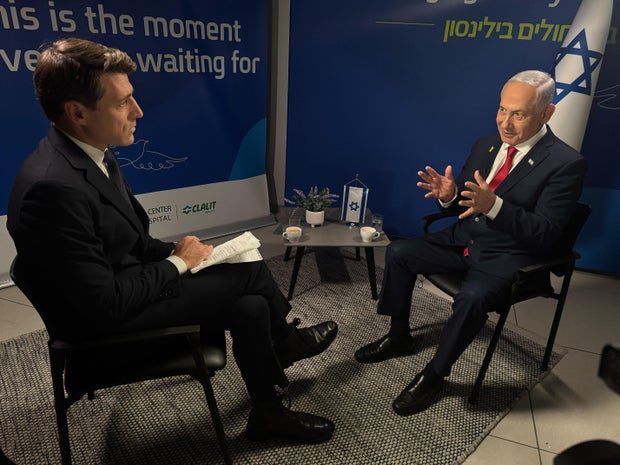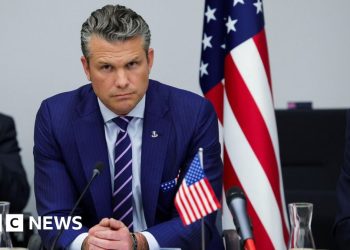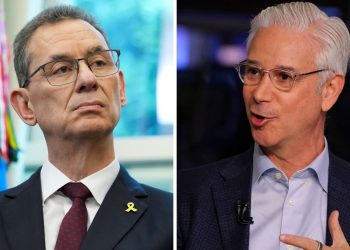Tel Aviv — Israeli Prime Minister Benjamin Netanyahu met with “CBS Mornings” co-host Tony Dokoupil Tuesday evening at Rabin Medical Center just outside Tel Aviv, where the Israeli leader and his wife Sara visited recently repatriated hostages and their families on their first full day back together.
Each of the former hostages described their experience in captivity to the prime minister, detailing long hours spent underground with limited access to sunlight and scarce food.
Avinatan Or, who lost at least 60 pounds during his Hamas captivity, still relished the embrace of his partner, another former hostage, Noa Argamani.
Netanyahu said he learned that, like many other former detainees, Or never lost hope.
“They believed that somehow we would get them out,” the Israeli leader told CBS News.
Now the overarching question is whether this moment of hope for Israel and the region can last.
Israel gives ‘a chance for peace’, but the war is not over
President Trump has repeatedly stated since he helped negotiate the ceasefire and hostage release agreement that took effect Friday: the war is over. But this is clearly not the case.
Israeli troops are still deployed in more than half of Gaza, and in the rest of the decimated Palestinian territory, the CBS News team in Gaza saw Hamas returning to the streets, still armed, and apparently facing rival groups – once again exerting its power.
Asked about these realities, Netanyahu told CBS News that his government had agreed to “give peace a chance.”
He noted that the terms of President Trump’s 20-point peace plan “are very clear: Not only will we get the hostages out without withdrawing our military, but we will subsequently achieve both demilitarization and disarmament.”
“We also agreed: Okay, let’s finish part one. Now let’s give a chance to do part two peacefully, which is my hope.”
SAUL LOEB/Piscine/Reuters
Netanyahu, in his extensive interview with Dokoupil, said it was “always the responsibility of the head of the Jewish state to ensure that the Jewish state is never jeopardized in its very existence.”
In a US poll conducted by the Pew Research Center in late September, only 35% of respondents expressed a positive opinion of the Israeli government, compared to 47% in 2022, before the start of the war. The survey also found a significant age gap in U.S. support for the Trump administration’s provision of robust military aid to Israel amid the war, with those 65 and older more than twice as likely as those under 30 (34% versus 13%) to say the U.S. was providing “about the right amount of aid to Israel.”
Dokoupil asked Netanyahu if it would be possible to remedy such perceptions, and how.
“I think so,” the Israeli leader said. “I think the first solution is to end the war as quickly as possible – something I’ve been trying to do against all this counter-propaganda. Of course I want to end the war. Who wants it to continue? You know, I’ve been in war myself, I’ve been in battles… you have to be crazy to want wars to continue.”
There are many challenges ahead in achieving even that initial goal, as Hamas has so far refused to completely disarm, the remains of at least 20 deceased Israeli hostages have yet to be returned, and Israel said on Wednesday it would limit the amount of humanitarian aid entering Gaza – delaying key aspects of the first phase of Mr Trump’s peace deal.
But what happens next is just as vague.
Who will govern Gaza?
Dokoupil asked Netanyahu a question that Mr. Trump’s peace plan only vaguely answered: Who will govern Gaza if and when the war ends?
“The only names mentioned are Donald Trump and Tony Blair. Is Tony Blair going to be president of Gaza?” asked Dokoupil, referring to the former British leader chosen by Mr. Trump to serve on a transitional “peace council” to help administer the enclave and its roughly 2 million people.
“I doubt it,” Netanyahu replied. “But I think this is a period of transition and we want to shape, you know, governance that works – that is not made up of people committed to our destruction. Because if we… if we put them there, then we repeat it over and over again. And we don’t want the massacre of October 7 to repeat itself.”
Netanyahu acknowledged that while many Gazans, including young men who have endured two years of brutal war, may wish to continue fighting against Israel, “Gaza is not uniform.”
“There are Gazans who are fighting Hamas and saying, ‘we don’t want this anymore…many people in Gaza now know that Hamas has brought catastrophic consequences to them because of its fanaticism.’
“The most important thing to destroy fanaticism is to destroy some hope,” Netanyahu said. “The hope that fanaticism will achieve its results. When people know that Israel is here to stay, they will not destroy the Jewish state.”
The best way to achieve this ambition, however, remains a subject of intense debate.
Netanyahu on the prospect of a two-state solution
The United Nations and many world leaders have long insisted that the only way to ensure lasting peace in the Middle East is to give the Palestinian people what they have not had since the creation of the modern state of Israel nearly eight decades ago: an independent state of their own.
Global pressure increases on Israel accept the creation of a Palestinian state along its borders, a concept long discussed as the two-state solution.
But in recent years, Netanyahu’s government has rejected the idea — and the Trump administration has definitively abandoned the U.S. government’s long-standing calls for a Palestinian state.
“When I talked about it, it was not the proposal that people are making now,” Netanyahu told Dokoupil on Tuesday. “I guess, okay, they’re two sovereign states and a sovereign state has, for example, military power, it can make deals… The Palestinians should have all the powers in peacetime to govern themselves, but they can’t have the powers to threaten our survival. That sovereign security power must remain in the hands of Israel.”
CBS News
“Otherwise, the jihadists take over,” Netanyahu said. “Iran immediately takes power. And this is what happened every time we left the territory: the most extremist fanatics entered.”
He admitted that ceding some territory to Palestinian authorities, as Israel did in Gaza, did not amount to the creation of an independent state, but he said it was “perfectly aligned with the reality” of circumstances on the ground.
“It is a reality that if you had a Palestinian governance that would stop teaching its children to destroy the State of Israel… obviously, if you have that and they educate them for peace, then I think you can have a different reality,” the Israeli leader said, adding that it “could take generations” to get to that point.
And even if Israel ultimately considers Gaza’s leaders and people deradicalized, Netanyahu said it would still need to remain “under the control of military power to prevent our destruction.”










